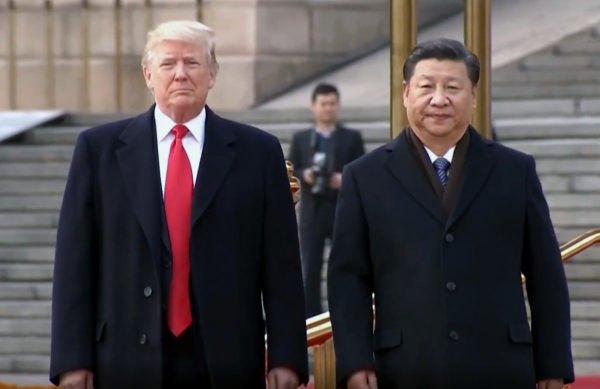◎ Here are three key takeaways from Trump’s trip to China.
President Donald Trump visited China from Nov. 8 to Nov. 10 as part of his 12-day Asia tour. He was cordially received by Xi Jinping—highlights include a private tour of the Forbidden City and a tea session in an imperial building that was funded by the United States government under President Theodore Roosevelt. Both Trump and Xi gave face to each other, as evidenced by the deals and understandings which Trump got for the U.S.
Here are three key takeaways from Trump’s trip to China.
1. China and the U.S. are in sync on North Korea
During a Nov. 9 press briefing at Beijing’s China World Hotel, Secretary of State Rex Tillerson said that Xi and the Chinese delegation “have been very clear and unequivocal they will not accept a North Korea with nuclear weapons.” Trump and Xi also had a “very, very detailed exchange” on what the U.S. and China were doing about reining in the Kim Jong Un regime’s nuclear ambitions. On Nov. 11, Trump tweeted that Xi is “upping the sanctions” against North Korea.
The close Sino-U.S. coordination in Beijing stood in contrast to the situation in March when Trump tweeted in March that “China has done little to help” with the North Korean nuclear issue.
Our take:
- The People’s Republic of China (PRC) and the Democratic Republic of Korea (DPRK) belong in the communist ideological camp. Diplomatic relations between the two countries, however, has been lukewarm for the most part despite China’s very costly intervention in the Korean War.
- Based on our research, the Jiang Zemin faction’s leading members have close ties with the Kim leadership. North Korea’s procurement of nuclear technology from China is the result of factional struggles inside the Chinese Communist Party (CCP).
- Xi Jinping’s attitude towards the two Koreas contrasts with previous Party leaders. Since taking office in 2012, Xi hasn’t visited North Korea nor received Kim Jong Un in China. Meanwhile, Xi has improved ties with South Korea and even invited the South Korean leader to his grand parade in 2015.
- Shortly after Xi and Trump met in April, the U.S. applied military pressure on North Korea by deploying naval vessels near its waters. In September, China cooperated with the U.S. in enforcing tough United Nations sanctions against North Korea.
- We believe that the coordination between Xi and Trump on North Korea suggests that Xi is abandoning the DPRK, the PRC’s communist bedfellow. Xi could eventually go on to implement startling political reform in China.
2. Closing the trade deficit
Commerce Secretary Wilbur Ross announced that U.S. companies had signed $250 billion worth of business agreements and deals in China. The deals involve firms like Boeing, Caterpillar, General Electric, and Qualcomm, as well as agricultural products and natural resources products like soybeans and natural gas.
During a bilateral meeting and a press conference, Trump said that the massive U.S. trade deficit to China was caused by the “incompetence” of previous U.S. administrations instead of faulting China as per his rhetoric as a presidential candidate. Tillerson later explained Trump’s statement during his press conference.
Our take:
- Many observers note that the $250 billion in deals doesn’t accurately reflect what Trump accomplished during this trip—some of the deals were previously agreed upon, while others are non-binding understandings, not business contracts. And Trump is still some ways from reversing the “$300 to $500 billion trade deficit” despite the slew of deals. But the deals lend the impression that Xi had given ground and face to Trump on the economic front.
- Trump praising Xi and his not blaming China for the trade deficit coincides with our take that both leaders had earlier agreed to a deal benefiting both countries. (See our Sept. 14 brief.) So Trump will likely not pressure Xi on economic matters so that Xi can resolve the CCP’s internal issues and fulfill his part of their deal.
3. Tackling the drug problem
During a press conference on Nov. 9, Trump said that he and Xi had discussed the “deadly drug trade” of China manufactured fentanyl into the U.S. which had destroyed “lives in the millions.” Trump added that he and Xi are focusing “very strongly” on tackling the issue.
According to the Centers for Disease Control, an estimated 20,000 Americans were killed by fentanyl in 2016. In August, Trump declared the opioid crisis a “national emergency.”
Our take:
- The CCP has long been lax in supervising and regulating China chemical drugs and food manufacturers, resulting in having long-standing food safety and drug issues. Thus it is questionable if the CCP can tackle the export of opioids to China.
- During the Second World War, the CCP grew opium in Yan’an and sold it to the Chinese in Kuomintang-controlled territories to finance their operations.
- Trump and Xi didn’t announce the specifics of how they would tackle the opioid issue, but Xi will likely have some difficulty in implementing any anti-drug agreement. The Jiang faction, while weakened after the 19th Party Congress, is still largely in control of the CCP’s domestic security and legal apparatus that will be responsible for regulating China’s drug sales.












